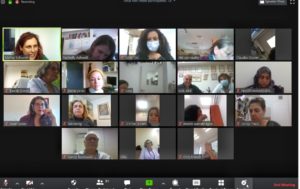Since the beginning of the coronavirus crisis, we at the JICC’s Cultural Competency Desk are thinking about the multitude of communications challenges that require drastic changes in the way we utilize health services.
It’s not obvious that everyone can use health services via phone or Zoom. It’s not obvious that everyone knows and understands the health guidelines, even though they’re all over the media. It’s not obvious that someone who needs urgent medical care (especially not related to COVID-19) will seek it at this time. It’s not obvious that a hospitalized person will fully recover, if he doesn’t have extended family to support him. So much new uncertainty that has been added to the general state of uncertainty, which challenges the cross-cultural meeting even more.
On May 5, 2020 we held a professional development meeting (via Zoom, of course), led by our Dr. Michal Schuster, to try to explore these questions and issues, and to examine opportunities and existing responses that will help us overcome these challenges.
There were 30 healthcare professionals from all disciplines and all areas of the healthcare system, as well as those from professional schools for health care. They spoke about the challenges, as well as creative solutions that they’ve used. They shared their insights and original initiatives and noted the importance of cultural competency and adapting the medical response to diverse populations in a situation where the absurd has become the new normal.
One initiative was a “Zoom kiosk” for the ultra-Orthodox who didn’t want to use the Internet at home but needed to receive guidance or participate in different medical committees through Zoom; explanatory videos for populations who have difficulty reading technical documents; a voicemail-based service that made guidelines accessible for those without digital devices; and even purchasing tablets and providing training to connect patients relatives who are unable to visit due to strict guidelines.
This was all so amazing and exciting work, which already shows that while this is an extremely challenging era, it also offers opportunities for innovation and creative thinking, and many of the initiatives should remain with us to provide the best possible response, even after we return to routine. In the end, communication is communication, and caring professionals will find new ways to provide care and services.
We summed up the meeting with a range of practical and conceptual tips and recommendations, and invited all to consult with us further.
One participant noted, “Thank you for allowing me to participate in this amazing meeting, very exciting work.”
Here’s the Facebook post by Racheli Ashwal:
Here’s a Facebook post by our Michal Schuster:
Many thanks to the Jerusalem Foundation for their strategic support of Cultural Competency over the past decade.


